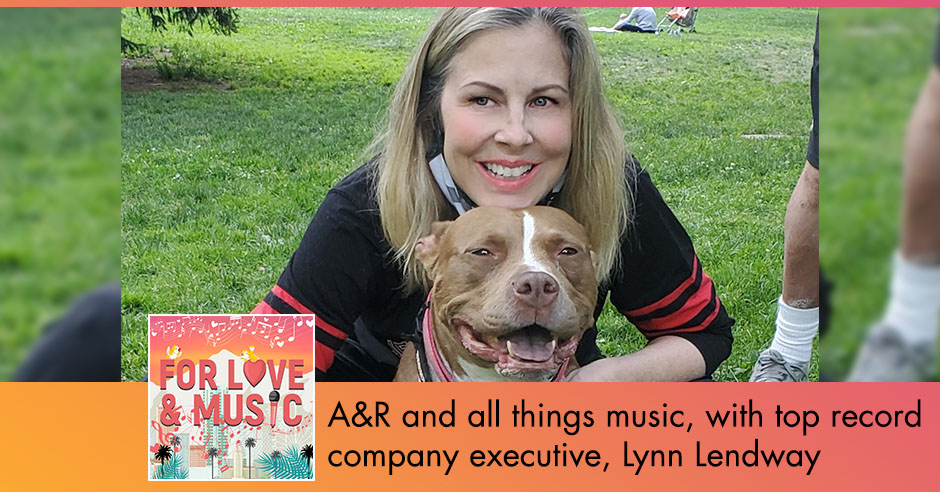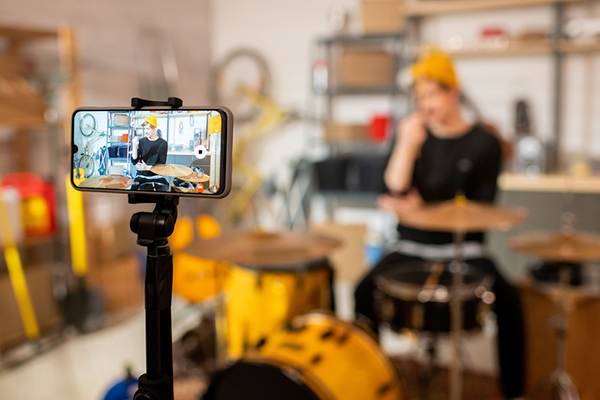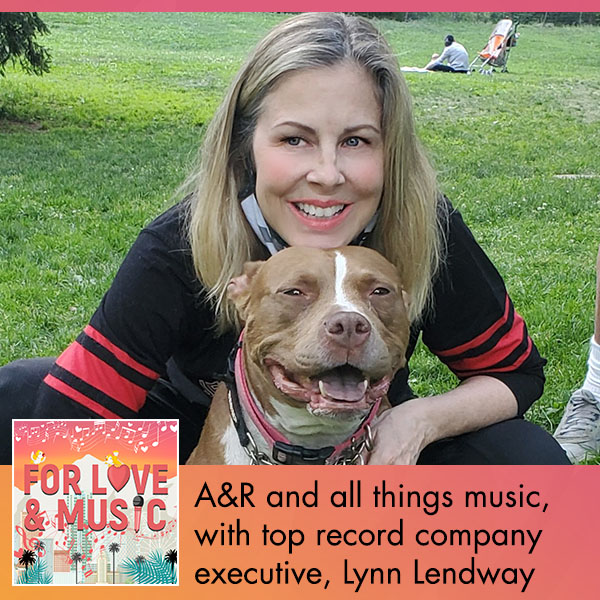
Tara Joseph sits down today with top A&R Executive, Lynn Lendway. Lynn explains what it takes to achieve success within the industry and how 2020 made us all find ways of creating interesting and innovative opportunities to try and achieve new goals during such a challenging year. She also looks back on how she entered the music industry, as well as her experiences as a tour manager and TV producer.
—
Listen to the podcast here:
A&R and all things music, with top record company executive, Lynn Lendway
Welcome to the show. Our guest is someone who you love collaborating with, is super smart, knows her stuff, and always has a smile on her face. Let’s welcome to the show the leading music industry and A&R Executive, Lynn Lendway. Lynn, how are you? It’s lovely to have you on the show.
Thank you for having me.
The readers can’t see this but I can see you’ve already got a fabulous Christmas tree behind you.
We did a very fun COVID thing with my family where on Friday we invited everybody to Zoom and decorate our trees together since we can’t be together. We had five different states, three different time zones. We decorated our trees, chatted, and played some music. It was a lot of fun.
You also have a little fur baby right behind you.
I’m set up in a different place because of the tree. He usually walks in front of every single Zoom meeting that I have, people will be talking and then all of a sudden, he decides that’s enough or it’s too serious and marches himself in front. He’s the comic relief for everything.
We’ve all been in lockdown for months. How has locked down treating you as a music industry exec? I presume your whole life has been Zoom. That’s all I’m hearing from people these days.
We can all be depressed about it because it’s changed. It’s hard to see bands and without seeing bands, sometimes you can’t tell the difference between good and great. You go, “The music is good but how do you get it out there?” That’s a huge challenge, but the interesting thing about this is it has shown a light on other opportunities that we had been overlooking. For many years, there were theater actors, and film and TV actors. Sometimes there were certain people whose talents bridged both of those. Oftentimes, you can be amazing at one and not quite get the nuances of the other. In the music industry, we’re going to see those bands who perform amazingly on stage and can turn a large venue into an intimate setting because of the charisma, the way they perform and the energy that they bring.
Oftentimes, they can’t make that small and intimate enough for a screen. We’re going to find certain artists who are incredibly amazing, intimate and find a way to connect through screens. That’s going to be their main mode of performing. It’s created an opportunity to use my imagination. When I’m talking with my colleagues and staff, we come up with different ideas on how to look for artists and what we’re looking for. You don’t look for faceless artists, I don’t mean that as anything because there are artists who create music that people want to listen to. They don’t want to engage with the artists. Many meditation stations play these artists. They do incredibly well. They have strong followings but people don’t want to know who they are because it takes them out of their meditation. Beyond that, you want an artist who people can relate to, and they need to find some way to do that. Screens are creating not just an alternate method to get us through these times but it’s going to carry forward after this.
Look at yourself as a product. Click To TweetDid you find there’s a specific platform that you have the most success in finding talent on?
I don’t. My friends are my platform, my workers and people I’ve known in the industry for years. I’ve been fortunate to know some kids who have gone to the Clive Davis school and they turned me on to great up and coming artists, new opportunities, and things that I wouldn’t normally think of. I am friends with the dean of Berkeley. I’ll call him up sometimes and go, “What’s cool? What’s new. Here’s what I’m hearing buzzing around.” Inevitably he’s going to go, “Gaming music. I know these three people.” He never fails to turn me on to something amazing whether it’s something that I can personally do anything with at the time. I’ve never been disappointed.
It will create new type of artists and new opportunity for artists simply because of the times that we’re living in.
I talk to people and I hear so many people and artists being depressed. I can understand the fear for those who haven’t figured out how to cross over. I still haven’t seen anybody nail it yet but I know it’s coming. There’s going to be a point where this becomes the way artists communicate. We’re all a little bit tired of seeing bedroom videos at this point. I have a feeling there’s going to be some creative and imaginative artists out there who’ll figure out how to get their music to people in an intimate way through our screens.
We should watch that space to see what’s new and innovative around the corner. You have had an incredibly illustrious career and still do have an amazing career. I met you when you were a VP of A&R at Decca US which is part of the Universal Music Group. Before that, you were an A&R Director at Sony Masterworks. You’ve been in a couple of the majors, the ground level finding and working with big established and new artists as well. It must be an exciting situation to be a part of.
It’s interesting because the fun is always in developing artists. The established artists are a machine. They’re already rolling, know what they’re doing, and have an amazing team of people working with them. They have the ability to afford the best of the best. The most exciting thing is working with developing artists because you get to be much more creative. You can find out where your thinking aligns with what the public wants, or how to create innovative ways to engage an audience. When I speak to young artists, it’s the hardest thing because they have to disconnect from themselves on those. The example I always give is anybody who’s talked to me and reading this is going to go, “She’s got to stop saying that.”
You have to look at yourself as a product. It’s like being the guy who invents a new hammer. You are selling a hammer to people who already have a toolbox full of hammers. What’s the thing that’s going to make them want your hammer? In anything that you do, you have to think of it where it’s like, what’s the thing that’s going to make this stand out? What’s going to make somebody listens to music, loves music, and wants to discover music? With all of the music that’s out there and everything that’s being released through every different platform and avenue, it’s impossible to listen to everything.
How are you going to connect with them? How are you going to identify your audience and speak to that lane specifically for a while? I laugh because I’ve never discovered a new artist. Somebody always brought it to me. Their mothers or friends discovered them long before I’m going to get in the picture. I never liked to say that I discovered an artist because it negates all of those people before me or whoever brought them to my attention. Working with a developing artist is sometimes the most frustrating and heartbreaking, but it’s always the most satisfying.
Was the music industry always something that you wanted to get into? Take me back to the beginning. Were you a musical child? How did you enter this crazy business?

From the time I was little, music was my true thread. We moved constantly. I’ve moved more than anybody I’ve ever met. The one constant wherever I went was music. No matter where I lived, I could always find the same music. Music was my true thread, that was my friend group. It was the thing that made me feel connected. When I didn’t have people to talk to because I was in a new place and hadn’t made friends yet, music was where I went when I felt lonely, excited, or I needed to feel brave to walk into the first day of school. I had no idea that there was a music industry. If I had known that I’d be like, “That’s the only thing I want to do forever.”
I came to New York to be in the fashion business. While I was in college, I went to FIT, we would go out dancing every Thursday night because that was back when the clubs were good. I met and became good friends with a guy whose family owned The Hit Factory, Troy Germano. We became such good friends when we were kids. Sometimes after dancing, we go to the studio, hang out and see who was in there. It was the music production that was exciting to me. I had no idea how records were made. I was in the fashion business for a minute and doing incredibly well. I saw an ad in the paper one day to MCA Records, which was one of the major labels at the time back when there were more than three. MCA was looking for somebody to answer the phones. I was like, “That’s the business I want to be in.”
Now I know that there’s a business. I don’t know what it is. I have a lot to learn but I want to do that. I’m glad my parents were dead because if they heard this and had to relive that phone call, it would kill them. They were disappointed because I was leaving my fast track. I climbed up from there. I got great advice when I was in it from a woman I worked with. She said, “Do everything that you can do in this business because everybody else only gets into one lane. You will always be the smartest person in the room if you know why everybody wants the things they’re asking for.” By my resume, you can see that I took her advice to heart.
Did you work with the band KISS? Were you tour managing the band KISS?
I wasn’t their tour manager. I was much too young for that but I learned everything about touring through KISS.
What an incredible band to work with. They’re still working.
They’re amazing, phenomenal and incredible. Paul Stanley introduced me to my husband. We are still happily married. It has been a long and wonderful relationship with them.
As you know, the show is called For Love and Music because those are the two reasons I moved to LA. It seems like many of the guests that come onto the show have a complete connection with love and music, that their lives were brought together. The two are interconnected.
It’s because music is completely emotional. You listen to music and you picture yourself and whatever you’re going through in the music. Everything in music is about our own perspective. When you’re in the music industry, it’s because it’s all you do. The only people you’re ever going to meet are in the music industry.
You will always be the smartest person in the room if you know why everybody wants the things they're asking for. Click To TweetStaying with the theme of love, I like to ask this question to my guests. Has love ever helped you make an unexpected decision in your career? It doesn’t matter if it’s no.
Every time I’ve made an unexpected decision in my career. If it’s not love, it’s passion. It’s either passion for something I see that everybody else needs to see, or it’s a passion for trying something new. It’s the love of something. It’s like, “I must try this.” My motto in the music industry has been and worked out well for me. It has been, “I don’t know how to do that yet, so I guess I better learn.” It’s worked out well. I’ve made some stupid decisions in my career path. I certainly don’t tell people to follow my career path because it’s not as stable as most. It’s been fun, interesting and I don’t regret anything I’ve done but every decision I’ve made every time I’ve changed something or tried something, it’s been for the love of something.
It’s a deep, meaningful answer. Someone once said to me, “The answer is I ran off with my secretary.” Thank you for sharing that with me. You were at A&R, and then you moved into management for some time. How did you find the whole management experience? Because being one myself, I feel that it becomes much more vocational rather than a job because it’s up and down.
You’re going to understand this better than anyone because you’re a manager. It was the most frustrating and rewarding job I’ve ever had. It is 24/7. I used to have rules that were silly like, “Unless you’re on tour and a bus breaks down, the rules are no phone calls after 9:00 unless you are bleeding or someone’s chasing you and trying to make you bleed.” I can’t. If you’re in the hospital, you can call me otherwise, work it out until morning. They didn’t always listen but I’m also not the warmest person.
I had to call once at midnight in the UK when I was still living in London to say that an artist I was representing had been singing on a TV show, and they had chucked fake snow on the artist’s head but rather than it being little dribbles of snow, it was a whole bucket. This artist inhaled it off of the bucket of snow and ended up in ER in this little backward hospital in the middle of nowhere. You do get all the calls, don’t you? Fortunately, they were fine.
You can call, you’re in the hospital. That’s an acceptable example. The other one is I’m like, “If there’s nothing I can do about it anyway, can you wait to whine to me until the morning?”
The one I remember having and this is 11:00 at night. It’s like, “We’ve run out of milk. Could you order some milk so it arrives at 8:00?” It’s like, “Who am I?”
I don’t have a lot of maternal instincts in me. I have been fortunate enough that the people I’ve worked with haven’t expected a certain level of care from me because my answer often is, I don’t care. Before anybody’s ever worked with me, I lay it out for them. I’m like, “I’m not warm and fuzzy. I’m going to help you. I want this to work. I think you’re great. I get the talent but you have to have a girlfriend, a mom or something who’s going to care about things like that because I don’t.”
I love how honest and blunt you are. I am learning from you. I need to say no more often.

I’m harsh in a way that sometimes people don’t want to hear it, but I don’t do it to be mean. It’s not like I’m one of those people going, “I’m going to be honest no matter what.” That’s ridiculous. I do try and take people’s feelings into consideration. If you’re an artist and you’re calling because you had a bad day, “You have a closer friend than I am. Call them.”
This is the best. You and I have worked on an artist together and you were caring, comforting and incredibly nice.
I care for the artists that I work with, it’s just that particular artist also had a caring and loving family. You are a wonderful manager. She doesn’t have to come to me for dumb things.
With the group that you were managing, you also made a successful TV show with them. Adding to your credits, you are also a successful TV producer. What can’t you do?
That was one of those things where it was like, “I don’t know how to do this, but I guess I should figure it out.” It happened because the band had met this agent from William Morris. They thought he was a concert promoter and they needed an agent. It turned out he was not. He was in the TV area. It was like, “Let’s make a TV show.” I remember we would take long walks in New York City at night trying to figure out how to make something look like a TV show out of these guys. We’re like, “They can’t act, they’re not actors. How do we do this?” We created this thing that was loosely based on real-life and enough so that many people watching it thought it was a reality show. It was great for me because we employed every amazing comedian in New York City at the time.
Shout out to Lynne Koplitz and Jay Oakerson because they were the stars of the show. They were amazing. Lynne Koplitz played their manager. She’s tall and beautiful. She is supermodel pretty. People thought she was the manager. I remember one night they were on tour, it was in Philadelphia. We got there and the merch guy, the guy who sold their merch, hadn’t shown up. I was sitting at the merch table waiting for him to show up. I’m like, “I’ll sell her merch. I don’t care.” These girls came up and they’re talking about the band. They’re all excited and snotty. They look at me and they’re like, “Do you know the band?” I’m like, “Yes I do.” They’re like, “Were you part of their organization?” I said, “Yes, I am.” They said, “What do you do? Is it to sell the merch?” I said, “I’m their manager,” and they argued with me, “No, you’re not. We’ve seen their manager.” I was like, “Amazing. You’re right, I’m selling the merch.”
With that, nobody ever got to complain to me. That was an incredibly fun time. The hours were long. It was a great group of people. Working with the comedians was incredible. Joan Rivers was a regular on our show and she is magic. The loss of her is one of the saddest things we all felt. She is a spectacular human. On top of that, the crew was wonderful. They were open. None of them looked down and were like, “You don’t know what you’re doing. This is your first time.” They were all incredible. They were professional. It was amazing the amount of work we got done and the difficult circumstances of working with a band that couldn’t act.
When you finished with that particular project, you then went back into A&R and that’s when you were at Sony.
Sony was wonderful. I always tell people because they’re like, “You’re not at Sony anymore,” I didn’t leave because I didn’t love it. I left because there was an opportunity to do something else that I wanted to try. I loved everybody at Sony. The interesting thing about Masterworks at Sony is that it’s a small enough company under the Sony umbrella that it flies under the radar. The guy who’s the head of it is an amazing deal maker. He’s creative in how they do it. If Masterworks had been a bigger company, they wouldn’t be able to do a lot of the things they’ve been able to do. Everybody was in everybody else’s business. There were departments but it was a lot of fun. It was a team. I had been hesitant to get back into the major-label business because times had changed. I enjoyed working with developing artists, trying to develop an artist to a major label system. It has its challenges and is a different animal than I had been used to. Getting back in that way was a good opportunity for me. It was a nice way to go.
Everything in music is about your perspectives. Click To TweetWe’re nearly into 2021. What can we hope to see and hear from Lynn Lendway in 2021 and moving forward, COVID aside? Let’s say we’re all vaccinated, healthy and traveling around.
I was going to say, “Hopefully, I’ll be back on an airplane and out to see you again soon.”
I hope so. I do.
The thing that I hated the most prior to this was the constant travel. I feel like I was on an airplane more than I was anywhere else. Now, it’s the thing that I miss like, “If I just can get on an airplane, go someplace and visit friends.”
Make sure you come to LA quite quickly.
I will. Right before we got on, I was with somebody else who I am madly in love with who is in LA and we were talking about it. Both of us were like, “As soon as this lifts, we’re getting on planes. I’m coming out to see you.” We better match that up. I’m hoping that there are some interesting holes and opportunities in the industry that I’m hoping to be able to find a way to flesh out.
I hope that you and I get to collaborate on another project or artist together at some point.
I hope so. It’s when you meet somebody and you know they’re meant to be in your life, you are that person. You’re stuck with me.
I feel honored.

We’ll see if you say that once flying starts again. There’s a knock on your door.
We’ve got a couple of spare bedrooms so any time, and a cat, and Bobby.
He’ll come too. Except we’ll never see him. He’ll be out with his musician friends doing his musician thing.
Maybe he can serenade us all in the evenings.
That’s the thing I always stop. During COVID, he’s started learning how to play the piano. There’s bass and guitar that he’s already mastered. Now, he’s learning how to play the piano. After a while, I’m like, “There aren’t enough doors to close between us in an apartment.”
I do look forward to meeting him at some point. Thank you for coming onto the show. It’s been such a pleasure to chat with you and have a catch-up.
Thank you for inviting me.
You are wonderful. Thank you.
I’ll speak to you soon.
Thank you to our readers. You will be hearing from me again soon. Bye for now.
Important Links:
About Lynn Lendway

Provide expertise in strategic career management and music supervision to artists, producers, and engineers in music, film, and TV industries.
Manager, Indie Rock Band: Jumpstarted the career of ZO2 through TV exposure (Z Rock), 3 album releases, and national tours with major stars, including KISS’s VH1-sponsored 40-city Rock the Nation Tour.
¡ Music Supervisor, Films: Including 18 Shades of Dust (Danny Aiello) and Federal Hill (Trimark Pictures).
¡ Business Consultant: Engaged by artist manager to create and pitch financial proposal and business plan for a new production company. Successfully secured $100K funding despite client’s lack of industry exposure.
Z Rock (IFC Network), 2008–2009 CREATOR & EXECUTIVE PRODUCER
Created Independent Film Channel’s Z Rock, the 2-season (2008–2009) semi-scripted comedy series co-starring Joan Rivers. Originally conceived to create visibility and market the aspiring rock band ZO2, the show evolved to IFC Network’s highest rated original program. Conceptualized created, and negotiated storylines, scripts, programs, proposals, pitches.
Guests included Daryl Hall, Gilbert Gottfried, Melissa Rivers, Chris Jericho, Constantine Maroulis, Bethany Frankel, John Popper, Patrice O’Neal, Greg Giraldo, Dave Navarro, Dee Snider, Dave Attell, Sebastian Bach, Frank Stallone.
Riker Hill Records, 2007–2009 CHIEF OPERATING OFFICER (COO)
Secured $1M funding to create a full-service, indie rock label with distribution through IDN and later RED/SONY. Orchestrated promotional opportunities that included events such as Tony LaRussa’s annual San Francisco fundraising event for the Animal Rescue Fund (ARF) and music placement in TV shows such as MTV’s The Hills.
Mike’s Artist Management, 1993–1999 PRODUCER MANAGER
Sought out and secured business opportunities with artist managers and major labels. Negotiated producer fees/contracts; created deal memos; managed $200K-$500K budgets. Clients included multiplatinum record producers Paul Kolderie and Sean Slade (Hole, RadioHead, The Pixies).
The Hit Factory Recording Studios, 1992–1993 BOOKING MANAGER
Managed studio bookings and rental equipment at one of the world’s most renowned recording facilities. Worked with artist and label reps to manage artist recording needs, schedules, equipment and budgets.
Zomba Entertainment, 1990–1992 ASSOCIATE PRODUCER MANAGER
Instrumental in creation of the producer management arm of the UK-based music company consisting of music publishing and record label, Jive Records, at a time when Jive Records, under founder Clive Calder, was the most successful independent label in the music industry.
917-685-2682 | lynnlendway@gmail.com
24/7 Entertainment, 1999–2014 PRESIDENT
LYNN LENDWAY
917-685-2682 | lynnlendway@gmail.com
KISS, 1988–1990 RECORDING AND TOURING MANAGER
Liaised with PolyGram Records to schedule and coordinate recording projects and public appearances. Coordinated with Tour Manager on all aspects of touring.
MCA Records, 1986–1988 A&R MANAGER
Love the show? Subscribe, rate, review, and share!
Join the For Love and Music Community today:

